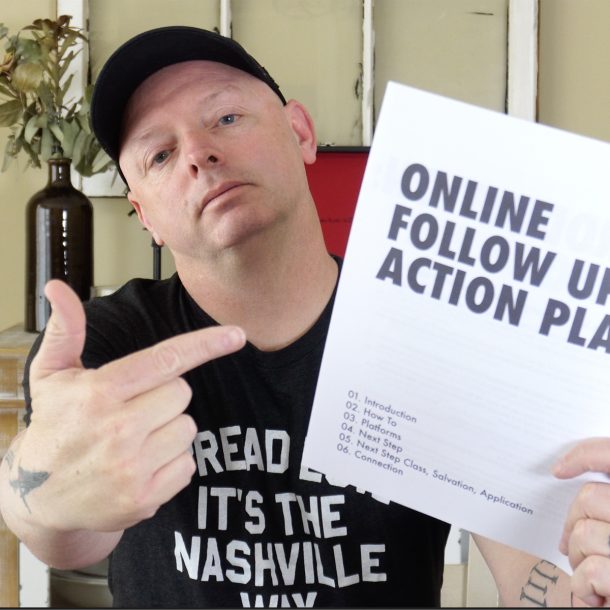Do you ever find yourself reading something and thinking: “how does this apply to my creativity, church, ministry, organization, or leadership?” It happens to me all the time almost to the point that it is frustrating! The other day I was reading an article online about a new book called: “An Attitude of Excellence by Dr. Willie Jolley. Dr. Jolley is a motivational speaker, and part of his new book revolves around the idea of creating excellence not just in what you do but in the attitude from which you execute, Jolley calls this pattern the Ten Commandments of Superior Customer Service. Now, before you check out, I have shortened these and added some application for you in your ministry. Further, I have added 1a to this list because in our use I think it is VITAL!
1A – KNOW YOUR STORY – If you don’t know why your church exists, what makes you unique, why people would miss you if you disappeared, you have a story problem that no list can help you fix. God called you and gave you a specific purpose in your community. Stop copying others and settle into what makes you a designer original, then tell that story every opportunity you can! Your creativity is the equalizer that levels the playing field for you! Cultivate it.
1B – SERVE WITH A SMILE: Smile! Have fun! You are sharing hope with your community. Jolley is quoted in the article saying: “It makes my day to be able to help make your day.” It should make our day to share hope so everyone should be smiling.
2 – Go the Extra Mile: Do for one what you wish you could do for everyone. Go out of your way to make each person feel known and valued and help connect them to purpose and community. It costs you very little but has a fantastic ROI!
3 – Greet, Speak and Be Real Sweet: Slow down, say hi to everyone, look people in the eye. Listen to questions and dig for stories. Keep your head on a swivel for opportunities to engage!
4 – Say Thank You and Please – A LOT: Be so kind. I mean, it is a fruit of the spirit. Kindness creates an atmosphere that is discharged. It permissions people to let down their walls and Jolley points out that it is a sign of respect and respect builds confidence and confidence leads to trust. That’s a winning formula for life change.
5 – Be Willing to Apologize Quickly: Say you are sorry. I tell my twins this about a million times a day. It matters. Even if it is not your fault, and maybe not even true, apologies go a long way to amazing atmospheres. People will tell you “it’s too loud,” “no one said hello to me,” “I don’t like that song.” Lead with an apology, then try to cast some vision for why we are intentionally doing what God has called us to do!
6 – Anticipate: What is the easy next step? What is going to happen and how do we get ahead of it beforehand? Good or bad, it is vital we are thinking forward. The “lead up leaders” in our organizations, the rock stars, are not thinking about next, they are consumed with 3 steps from next.
7 – Do What Is Necessary, Not What Is Comfortable: Don’t make people work to get connected. So many churches and organizations plan with the intent to make things easy for their teams and volunteers, not for the guest. It is difficult to win when we make people work to get connected. Make decisions based on the simplicity of what is needed and keep it so accessible for people to take the next step.
8 – lt Take Responsibility: I love that Jolley talks in this article about “owning it.” We have to be owners of the vision, not renters. When you own something, you treat it differently. When volunteers and staff “own it” they don’t just care about their realm of responsibility, they will do anything they can to help the organization accomplish its goals. Solve the problem and own the moment!
9 – Lighten the Lines: This concept is brilliant. (I can say that because it is not mine!) No one likes to wait. Be present with the person in front of you and look for help to take care of anyone waiting to get to you. You can see this every weekend in your lobby if you pay attention. Making people wait communicates that you don’t have the time or are disrespecting what a guest feels or needs. Address it, pass them to someone, or ask them to wait while you help someone else. Addressing the issues mitigates it for a minute.
10 – Practice the CANEI Principle: “CANEI is Dr. Edward Deming’s concept that stands for Constant and Never Ending Improvement.” I love the question “How do we do this better?” When we apply this question to everything we do (check in’s, announcements, transitions, parking, sign-ups, you name it), we create a culture of improvement. Every weekend is a chance to show what we learned and improve on it.
Ok, so we are about to start a new year. Are you ready to implement these principles on your volunteer teams, with your staff, or just personally? If I can help you in any way, don’t hesitate to reach out and let me know, I would love to be part of your story. And if you have any questions, just DM me or text me at 615.457.7261.




